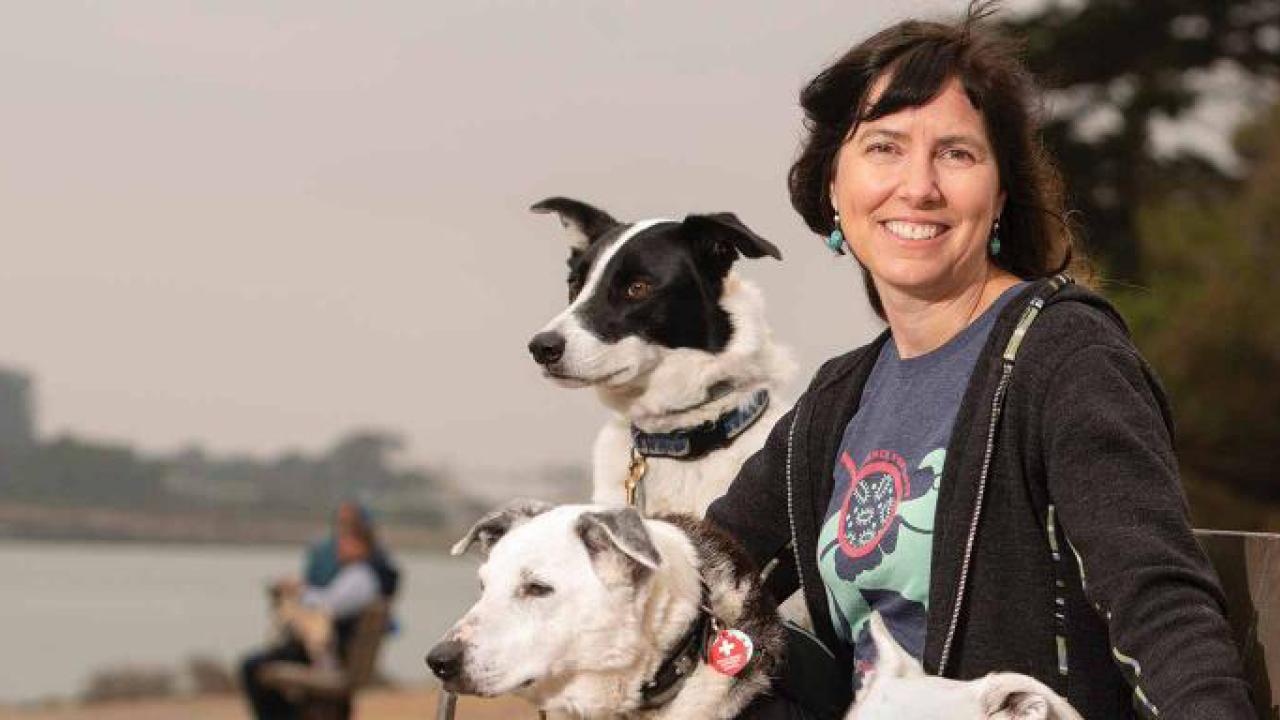
Grad Alumni Solve Real-World Problems Through Their Own Technologies
Pet Project
Holly Ganz, Ph.D. ’04, was working in a lab on campus in 2015 when she launched a Kickstarter campaign to raise funds to study the microbiology of cats. She asked for $3,000 and got more than $23,000.
As part of the campaign, Ganz offered to analyze the microbial diversity of shelter cats and those of her contributors. By sequencing the microbiome — the bacteria, fungi and other organisms that live in cats’ digestive tracts — Ganz can pinpoint any imbalances, which can affect everything from digestion to immune system function.
“We learned that 20 percent of people who backed the Kitty Biome Kickstarter had a cat with a chronic digestive problem, particularly chronic diarrhea or chronic vomiting,” said Ganz. “What we had imagined would be a fun, playful thing ended up tapping into a real problem.”
Ganz founded Animal Biome, which now sells microbiome testing kits and supplements for cats and dogs, so-called “poo pills,” which operate like fecal transplants. (These pills are made of fecal material from healthy donors, are delivered orally and correct an imbalanced microbiome 80 percent of the time.)
Going forward, Ganz said she would like to see microbiome testing become a part of general wellness tests at veterinary clinics. She currently works with about 35 practices. She will also explore the microbiome’s relationship to obesity, which could have implications for diabetes.

Immune Boost
As a graduate student, Maelene Wong, Ph.D. ’13, pioneered a new process for removing immunological barriers to human transplantation of animal-derived tissues.
Molecules called antigens elicit the immune response, and Wong has developed a way to remove these antigens from animal tissue in a way that maintains the natural tissue matrix. She started ViVita Technologies in 2012 to take her method to the next level. A year later, the company won Big Bang!
“I’m not going to claim that we eliminate all of the antigens, but we reduce the burden enough that the body doesn’t find it offensive on the short term,” said Wong. In the long-term, she added, ViVita is aiming to prove that the treated tissue can fly under the radar from immune response so that normal regenerative processes still occur, changing the matrix from animal to human in origin. “In the long-term that allows the possibility of avoiding immune rejection altogether.”
Down the line, Wong said off-the-shelf organs could be a possibility. She is, however, starting smaller — with a patch product for reconstructive heart valve surgery. ViVita has partnered with a leading heart valve manufacturer to help validate the technology for market.
The next five to 10 years, she noted, will involve Food and Drug Administration studies, both animal and human, and then establishing manufacturing and sales of the patch.
“One doesn’t do a Ph.D. expecting to have something to help patients [in the end] — you want it to, but you intend to encounter hurdles,” said Wong. “The fact that this exciting technology came out of it is completely a cherry on top.”

Uncorked
Tim Keller ’00, M.B.A. ’08, worked in the wine industry for several years before returning to UC Davis with a desire to start his own winery. Thanks to a business plan clinic, his plans quickly changed.
Asked to consider a problem that needs solving, his vineyard experience led him to the cork versus screw cap debate. While he said corks have a 5 percent defect rate, screw caps didn’t allow in oxygen, which wine needs to age and gain in quality. He had an idea for an oxygen-regulating screw cap.
VinPerfect launched commercially in 2011. (It won Big Bang! in 2008.)
“We sold about 35 million wine closures and raised $2.6 million in equity,” Keller said. “Then we got to the point where we realized we couldn’t go to the next level unless we could raise about $20 million.”
Last fall, Keller licensed the technology for his screw caps to Amcor, a global packaging company with expertise in wine caps. Keller said Amcor has plans to take VinPerfect caps global by selling them to wineries.
These days, Keller is helping other startups in their early phases with Inventopia, a resource-sharing space with tools many need to create their prototypes. Tenants pay monthly for use of the space. Inventopia launched last fall in Davis, and Keller already has plans to expand to a space 10 times the size (it’s about 1,800 square feet now). He also intends to launch another startup — one idea includes developing drone technology.
“Both my parents and both my siblings are entrepreneurs,” he said. “I think we were raised to see the world in that light.”
Read the full article on the main UC Davis website.
About Graduate Studies
Graduate Studies at UC Davis includes over 100 dynamic degree programs and a diverse and interactive student body from around the world. Known for our state-of-the-art research facilities, productive laboratories and progressive spirit – UC Davis offers collaborative and interdisciplinary curricula through graduate groups and designated emphasis options, bringing students and faculty of different academic disciplines together to address real-world challenges.
UC Davis graduate students and postdoctoral scholars become leaders in their fields: researchers, teachers, politicians, mentors and entrepreneurs. They go on to guide, define and impact change within our global community.
For information on Graduate Studies’ current strategic initiatives, visit the Graduate Studies strategic plan page.
